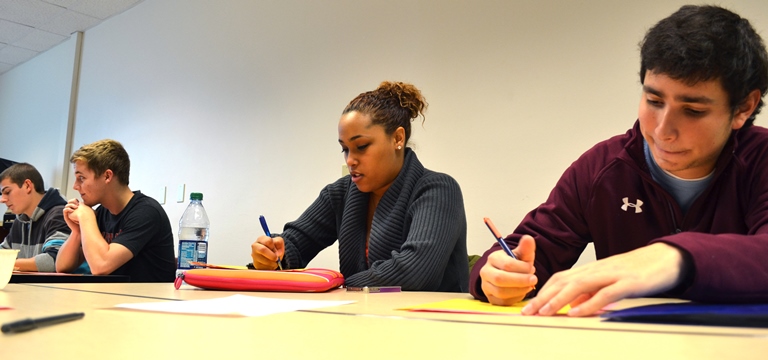Extended field experience and mentorship at center of College's transformed teacher preparation programs
by Sal Nudo / Sep 11, 2014

Significant changes are ahead for the College of Education’s Elementary Teacher Education Program, all of them designed to provide more opportunities to gain deeper pedagogical knowledge, formative learning opportunities, and supervised assessments that thoroughly prepare teacher candidates for their independent student-teaching experiences during senior year and for their future careers.
Sarah McCarthey, a professor and the director of Teacher Education in the College, said the transformed elementary program will help students be better prepared to work with children than ever before.
“They will have multiple opportunities to connect theory to practice and develop the pedagogical tools and dispositions to understand, teach, and assess children from diverse backgrounds,” she said.
Among the changes include new foundations courses for freshmen and sophomores, which will be team taught by faculty across the College; a new inquiry course for students to study children in classroom contexts; and a new course integrating visual arts, music, and dance taught by faculty partners in Fine Arts.
“These new courses will enhance students’ understanding of the content and connect them to schools and communities,” said McCarthey.
The program currently covers the K-9 grade range but will shift to grades 1-6 in coming years, according to McCarthey. The Global Perspectives theme, led by Professor Marilyn Parsons, is being piloted with 22 students in three partner schools this academic year: Leal Elementary in Urbana, Garden Hills Elementary in Champaign, and University Primary School, a lab school in Champaign. The theme will become one of several more permanent themes in the new program.
Jay Mann, director of School and Community Experiences (SCE), said the added supervision within the program by faculty members, graduate students, and clinical supervisors will occur earlier in candidates’ course of study, benefitting those who may need the assistance.
“I’m pleased to say we’re adding layers of supervision,” Mann said. “It’ll be a chance for us to better support candidates earlier as opposed to during the student-teaching experience, when consequential assessment can be overwhelming.”
Mann said the updates to the program are molded from The Danielson Group’s Framework for Teaching—the preferred state model for supervision and evaluation—as well as the new Educational Teacher Performance Assessment (edTPA), which offers instructors access to a broad assessment system that is aligned to state and national standards, including Common Core State Standards and the Interstate Teacher Assessment and Support Consortium.
Other enhancements to the elementary program starting in the fall of 2015 that Mann is enthusiastic about are:
- Placing candidates early on in community-based, familial settings with children that may involve nonprofit organizations, neighborhood groups, church organizations, and other community entities. The goal of such placements is to help candidates absorb and understand large realms of their students’ diverse lives outside of the classroom.
- Revised field experiences in the CI 405 class, Intro to Teaching Elementary Age Children, in which candidates will collectively visit classrooms to gain shared knowledge and discuss observations. Live streaming of classrooms and recorded observations of classrooms will also be part of the instruction. Mann described the classroom visits as “lab-based, rounds-based” observations that are similar to what aspiring doctors do to learn in the medical field.
- Enhanced partnerships with school placement sites in suburban Chicago that will provide live streaming and recorded footage of classrooms in action. The technology will allow students to observe teachers in suburban and urban settings, which many of them will later be able to compare to the on-site classroom experiences they’ll receive in the small urban and rural settings of Champaign-Urbana and surrounding communities, respectively.
In addition to the new program, the College is doubling the amount of assigned classroom experience in the class EDPR 250, Educational Practice. The update will allow for richer classroom immersions with accompanying assessments from supervisors.
McCarthey and Mann agreed that one of the most exciting components is offering classes and field experiences that will allow students to spend half of the day in classes on campus and the other half of the day working with teachers in an assigned set of classrooms within a school, allowing them to observe all of the subjects children are taught throughout the day in the schools.
While the more common one-to-one ratio of a teacher candidate under the tutelage of a cooperating teacher is beneficial, the College is looking to expand students’ horizons by offering them practical working experiences in a combination of classrooms, sometimes with more than one student-teacher in them. For example, clusters of students can lead a reading lesson with small groups of children in one classroom while another cluster of pre-service teachers in the classroom next door conduct science experiments.
“What that does is give them a chance to see different professionals practicing their craft, to take different ideas from different classrooms and implement them across a series of spaces,” Mann said. “It also allows them to work together, collaboratively as candidates, to co-teach and co-plan.”
The increased mentorship for future teachers by the College could translate to future teachers who evolve into topnotch mentors themselves, a crucial aspect to the profession.
Mann said today’s teachers aren’t just in the classroom—they also inhabit athletic fields, auditoriums, and can be found helping out in clubs and organizations. Due to that ever-expanding portfolio, prospective teachers need a well-rounded educational experience early on, which the new elementary education program, developed by a large group of faculty members in the College, will provide.
“Our students want to serve children in a broad sense, and we want that for them,” Mann said.
McCarthey agreed, saying the College strives to help students find jobs early on after graduation, which they often do, and succeed in numerous classroom settings.